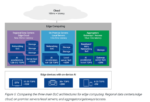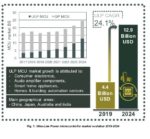On July 18, 2025, Steve Greenfield, an early-stage investor and author, delivered a compelling 45-minute talk at DACtv on the future of mobility. Quoting futurist William Gibson—“The future is already here. It’s just not evenly distributed”—Greenfield explored how emerging technologies and business models are reshaping… Read More
Podcast EP295: How Nordic Semiconductor Enables World-Class Wireless Products with Sam Presley
Dan is joined by Sam Presley, technical product manager at Nordic Semiconductor. With a background in electronics engineering, embedded firmware development and consumer products development, his current areas of expertise are hardware and software for IoT applications, with a special focus on enabling product manufacturers… Read More
Powering the Future: How Engineered Substrates and Material Innovation Drive the Semiconductor Revolution
Engineered substrate technology is driving an evolution within the semiconductor industry. As Moore’s Law reaches its limits, the focus is shifting from traditional planar wafer scaling to innovative material engineering and 3D integration. Companies like Soitec, Intel and Samsung are pioneering this transition, unlocking… Read More
Can Generative AI Recharge Phone Markets?
Consensus on smartphone markets hovers somewhere between slight decline and slight growth indicating lack of obvious drivers for more robust growth. As a business opportunity this unappealing state is somewhat offset by sheer volume ($500B in 2023 according to one source) but we’re already close to peak adoption outside of … Read More
A MIPI CSI-2/MIPI D-PHY Solution for AI Edge Devices
In late September, the MIPI Alliance held their DevCon conference as a virtual event. There were several excellent presentations at the conference. One of those was titled “A MIPI CSI-2/MIPI D-PHY Solution for AI Edge Devices” by Ashraf Takla of Mixel. Looking at the daily volume of technology news about applications moving to… Read More
Optimize RTL and Software with Fast Power Verification Results for Billion-Gate Designs
In every chip, power is a progressive problem to be solved. Designers have long had to rely on a combination of experience and knowledge to tackle this dilemma, typically having to wait until after silicon availability to perform power analysis with realistic software workloads. However, this is too late in the game, as it becomes… Read More
Apple Is Evaluating Scratch Resistant Diamond Like Coatings On Gorilla Glass
Despite the improvements in glass material used in smartphone displays, many, if not all, leading smartphone manufactures such as Apple and other smartphone manufacturers are evaluating a coating method that further increases the durability of screens at a cost of just pennies per display by coating them with diamonds.… Read More
Quantifying the Benefits of AI in Edge Computing
Many of us are now somewhat fluent in IoT-speak, though at times I have to wonder if I’m really up on the latest terminology. Between edge and extreme edge, fog and cloud, not to mention emerging hierarchies in radio access networks – how this all plays out is going to be an interesting game to watch. Ron Lowman, DesignWare IP Product… Read More
Qualcomm on Power Estimation, Optimizing for Gaming on Mobile GPUs
I don’t look at the RTL power estimation topic too often these days, so I was interested to see that ANSYS still has a very strong position in this area. Qualcomm is using PowerArtist on one of the most demanding modern applications – mobile GPU power gaming. Mobile gaming heavily loads the GPU, so any optimization in that area will … Read More
Minimizing Power Consumption in Ultra Low Power MCU Based SoCs
When it comes to extremely power sensitive applications such as IoT and edge devices, there is literally an arsenal of power saving techniques that could be used. The tricky part is figuring out which ones to use and how to use them for maximum benefit. This is coupled with the need to not hamper device performance or functionality.… Read More










Semidynamics Unveils 3nm AI Inference Silicon and Full-Stack Systems